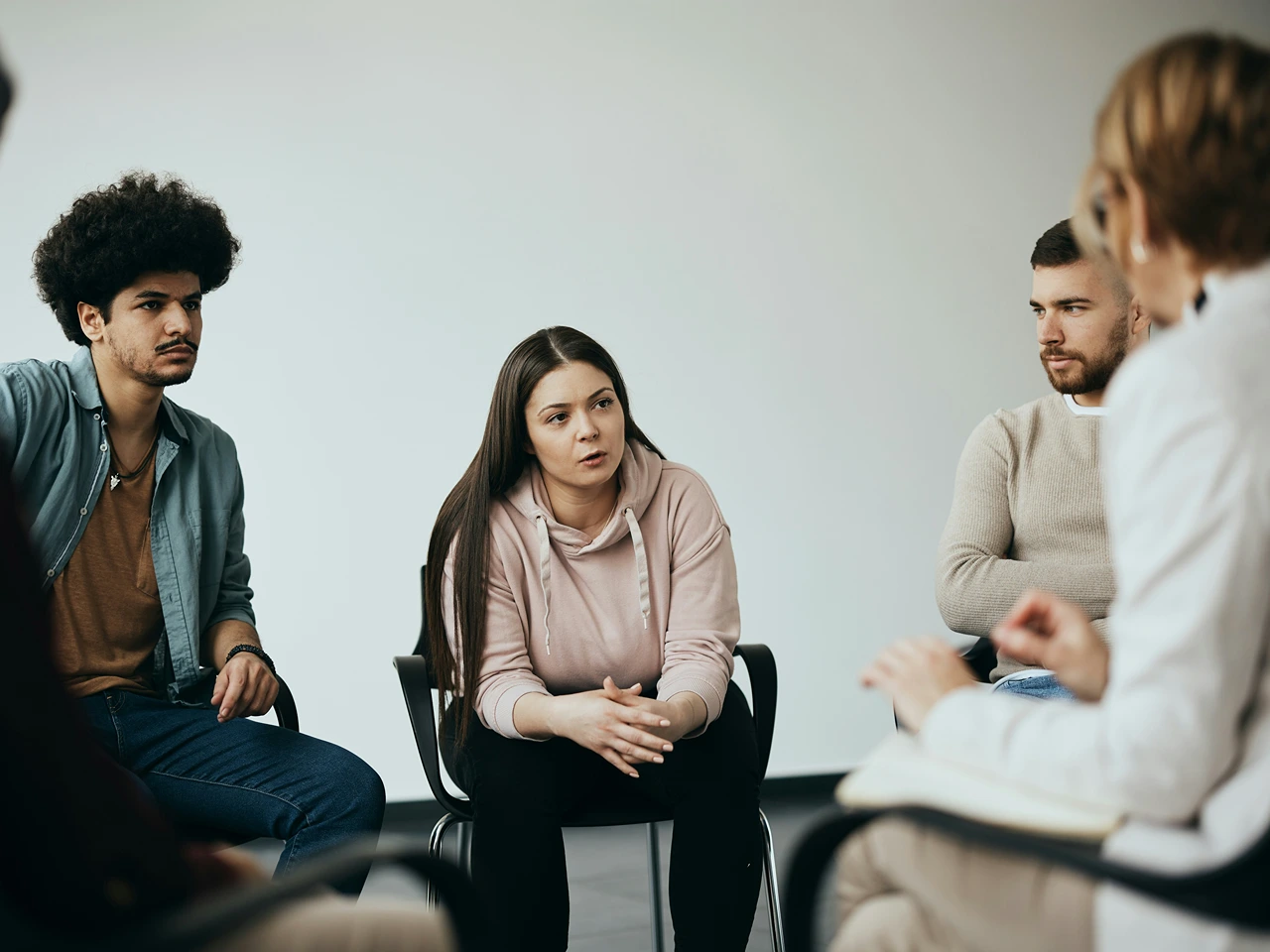
What is Mental Health First Aid? What You Need to Know
Learn what Mental Health First Aid (MHFA) is and why MHFA training helps people support others facing mental health problems with confidence and care.

What would you do if a friend suddenly shared they’re feeling overwhelmed, or if a coworker started showing signs of a mental health crisis? Mental health struggles aren’t always easy to see, and it’s normal to feel unsure about how to respond.
Mental Health First Aid (MHFA) is a training program that helps everyday people build the confidence and practical skills to step in and offer support when it matters. In this guide, we’ll break down the meaning of Mental Health First Aid, explain its core purpose, and highlight the ways it can positively impact both individuals and communities.
What is Mental Health First Aid (MHFA)?

Mental Health First Aid (MHFA) is a training program that helps members of the public gain the skills and knowledge to better manage potential or developing mental health problems. Similar to physical first aid, which provides immediate help until medical treatment can be obtained, MHFA teaches how to offer initial support to someone experiencing a mental health crisis or showing early signs of mental illness. It’s about knowing how to step in early when problems first emerge, giving support until professional help is available.
MHFA is now licensed in over 25 countries, including Canada, where it aligns with the standards set by the Mental Health Commission of Canada. By stepping in early, MHFA helps close the gap between spotting a mental health concern and making sure someone gets the professional care or treatment they need.
Why You Should Take Mental Health First Aid Training

Taking a mental health training program can be truly eye-opening, not just for the person directly involved, but for your whole community and workplace. It gives you practical skills to help someone whose mental well-being is slipping, making spaces safer and more supportive for everyone.
Early Intervention
MHFA teaches you to spot early signs of developing mental health problems, so you can offer help before things get worse. This proactive approach can prevent mental illness and suicide, while making it easier to address declining mental well-being before it turns into a bigger challenge.
Improving Mental Health Literacy
The course helps boost mental health literacy, making it easier to notice if someone is experiencing a decline in their mental well-being. You’ll learn how to offer support in the right way, increasing the capacity of your friends, colleagues, or community to respond with care.
Promotes Mental Health and Well-Being
By putting MHFA skills into practice, you can actively promote mental health in your workplace or community. You’ll increase the capacity to manage potential mental health issues and provide thoughtful support to people with mental health problems.
Workplace Benefits
Organizations that adopt MHFA training often see stronger psychological health and safety, lower absenteeism, and improved safety in the workplace. Employees trained in mental health or substance use support are better at noticing when colleagues are struggling and can provide initial support before professional help is needed.
Community and Public Safety Impact
Specialized MHFA programs improve interactions where mental health may be a concern, helping people in crisis situations get better outcomes. By learning these skills, you increase the capacity of your community to respond effectively and with compassion.
The Role of a Mental Health First Aider

A Mental Health First Aider is trained to provide help to a person in the early stages of mental health problems. Think of them as the first point of support—someone who can step in, listen, and guide until professional care is available. Key responsibilities include:
- Initial Support: Offer initial support to someone experiencing a health or substance use crisis. This might mean staying calm, listening without judgment, and making sure the person feels safe and not left to face things alone.
- Non-Clinical Guidance: Offer reassurance, share helpful information, and encourage people to reach out for professional support. MHFA isn’t a substitute for therapy or medical care—it’s about making sure someone gets the right help at the right time.
- Community Resource: Be the person people feel comfortable reaching out to—whether at school, at work, or in your community. By offering mental health first aid and pointing them toward professional help when needed, you help create spaces where talking about mental health feels normal, not intimidating.
- Crisis Management: Recognize when a crisis is unfolding—whether it’s suicidal thoughts, panic, or severe substance intoxication—and use their skills and knowledge to help people better manage potential mental health problems until professional help can step in.
Addressing Mental Health Problems

The MHFA training gives you the skills to step in and help with mental health issues before they turn into bigger crises. The training covers:
- Common Issues: You’ll learn to recognize and understand conditions like depression, anxiety, psychosis, eating disorders, and substance use disorders. Just as importantly, the training helps you notice when a person is developing a mental health problem, so you can step in early and make a positive difference.
- Crisis Situations: Sometimes things reach a breaking point. MHFA gives you the confidence to respond when someone is experiencing a crisis, whether it’s panic attacks, suicidal thoughts, or worsening mental health from ongoing struggles. The focus is on knowing what to do in the moment to support someone with a mental health problem or experiencing a serious crisis.
- Support Strategies: The program puts a big emphasis on practical skills—like listening without judgment, offering reassurance, and encouraging the person to seek help from professional sources. These strategies are key when providing mental health first aid to a person developing a mental health problem or experiencing a mental health crisis.
- Tailored Intervention: Finally, the MHFA standard reminds us that support isn’t one-size-fits-all. Help provided to a person developing symptoms of mental illness should be culturally sensitive and respectful. That includes approaches tailored for diverse communities, with special attention given to First Nations populations and others with unique needs.
What to Expect from MHFA Training

When you take a Mental Health First Aid course, you’re signing up for a hands-on, interactive way to actually learn skills that make a difference. In Ontario, Canada, these courses are available in person, online, or in a blended format, so you can choose what fits best with your schedule and learning style.
- Learning Components: The training course goes beyond lectures—it includes role-playing, simulations, and group discussions. These activities help you practice assessing a mental health crisis, choosing the right MHFA actions, and learning how to provide support to a person with a mental health problem in real-life situations.
- Certification: Once you complete the program, you’ll receive a certificate that’s valid for three years. It’s not just a piece of paper—it’s recognition that you’re equipped to step in and help when someone needs it most.
- Tailored Programs: Different groups have different needs, which is why there are specialized courses for youth, veterans, public safety personnel, and workplaces. Each program is designed to make the training as relevant and practical as possible.
- Cultural Sensitivity: Every community is unique, and the training reflects that. Courses can be adapted to ensure the support provided to a person respects cultural differences and feels effective and appropriate.
- Integration with Other Services: MHFA isn’t meant to replace professional care—it works alongside it. The training course helps participants connect someone to appropriate professional support so that a person experiencing a mental health crisis doesn’t feel left on their own.
- Community Impact: The more people who complete the training, the stronger the ripple effect. Widespread mental health first aid training helps build more resilient communities and promotes better overall mental well-being.
Final Thoughts
Mental Health First Aid is all about shifting how we notice and respond to mental health. By giving people the tools to recognize early warning signs, stay calm in crisis situations, and guide others toward professional help, MHFA bridges the gap between noticing a problem and taking action.
Whether it’s at work, school, or just in everyday life, these skills make our spaces safer and more understanding. The more people who know how to step in, the stronger and more caring our communities become.
Frequently Asked Questions
What is Mental Health First Aid (MHFA)?
Mental health first aid is the support you give someone who’s struggling, before they’re able to get professional help.
Foundation: It is a course designed to teach practical strategies for recognizing and responding to early mental health challenges.
Goal: The training equips participants to step in and provide reassurance until a crisis is resolved.
Approach: Just like traditional first aid, it focuses on immediate assistance before medical or therapeutic help is available.
Application: It prepares you to support a person who may be experiencing early symptoms of anxiety, depression, or other issues.
Community Impact: The program is designed for members of the public, making mental health support more accessible across schools, workplaces, and communities.
Why should I take MHFA training?
This training gives you the skills and know-how to help someone when their mental health might be at risk.
Early Detection: You’ll learn how to spot the signs that someone might be struggling emotionally or starting to experience a mental health issue.
Empowerment: It boosts your knowledge of mental conditions so you can respond with greater confidence.
Prevention: Acting early can minimize long-term harm and support better recovery outcomes.
Supportive Culture: By stepping in when people need mental health support, you help normalize open conversations about well-being.
Ripple Effect: More trained individuals mean workplaces and communities become safer and more compassionate environments.
Who can benefit from MHFA training?
The program is inclusive and designed to make support accessible for everyone.
General Public: MHFA is designed for members of all backgrounds, making it relevant across various settings.
Workplaces: Employees trained in MHFA create healthier work environments by spotting when health may be an issue.
Families & Friends: It helps loved ones recognize signs that a person may be in distress before things worsen.
Schools & Youth Programs: Young people benefit from trusted adults who can notice when a problem or a mental health challenge arises.
Communities: Canadian mental health organizations endorse MHFA, helping strengthen local networks of care.
What topics does MHFA training cover?
MHFA focuses on the information that prepares you to respond effectively in different scenarios.
Common Issues: You’ll learn about depression, anxiety, substance use, and other mental health conditions.
Crisis Situations: Training guides you on what to do if a person is in a mental health emergency like suicidal thoughts.
Practical Skills: The course helps you provide the skills and knowledge needed to offer reassurance and encourage professional help.
Tailored Support: Each module emphasizes cultural sensitivity and adapting approaches to individual needs.
Community Scenarios: Special focus is placed on how to respond when someone may be developing a mental health challenge.
What happens after completing MHFA training?
Finishing the program empowers you to make a real difference in people’s lives.
Certification: You’ll be officially recognized as someone equipped to support others in mental health situations.
Confidence: You’ll feel more prepared to approach someone who may be experiencing a crisis with empathy.
Practical Use: The training helps you stay calm and handle things effectively until the crisis is resolved.
Ongoing Relevance: What you learn will keep being useful, both in everyday life and when the unexpected happens.
Positive Impact: You’ll be part of a growing effort to strengthen mental well-being in our communities.
Check out more helpful articles
Lorem ipsum dolor sit amet, consectetur adipiscing elit, sed do eiusmod tempor incididunt ut labore et dolore magna aliqua. Lorem ipsum dolor sit amet, consectetur adipiscing elit, sed do eiusmod tempor incididunt ut labore et dolore magna aliqua.
I Don't Want to Do Anything: Why You Feel Mentally Exhausted and What You Can Do About It
Feeling like you don’t want to do anything? Find out why you feel unmotivated and learn practical ways to restore your motivation, balance, and mental well-being.

Key Red Flags of an Emotionally Unavailable Man and How to Recognize Them Before It’s Too Late
Learn to spot an emotionally unavailable man! Recognize signs of emotional unavailability, like pulling away and being distant, before getting emotionally hurt.

What Is Romantic Attraction? Understanding How It Shapes Our Feelings and Connections
Romantic attraction affects the way we feel, connect, and form relationships. Learn how this feeling shapes the way we build emotional bonds and how it influences our romantic orientation.

Contact US
Know who you want to book with?
Book Online HereHave questions about counselling or something else?
Call or email us.
Want help choosing the right therapist? Complete our connect form below.
We are ready and looking forward to meeting you. Get started today by clicking the link below and booking your free 15-minute discovery call. All our services are private and confidential.

Disclaimer: Content on this website is for informational purposes only. Visiting this website does not establish any type of therapist-client relationship with Upstream Counselling or its staff. Information obtained from this site does not substitute for a thorough medical and/or psychiatric evaluation by an appropriately credentialed and licensed professional.







